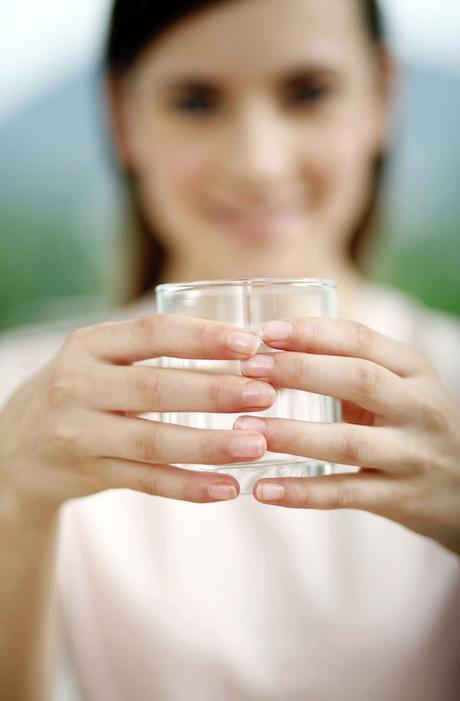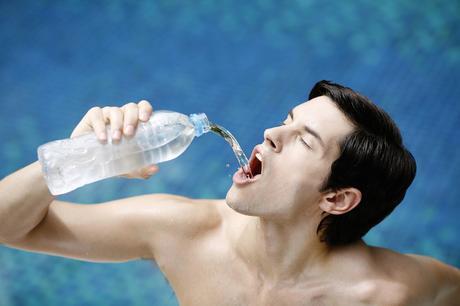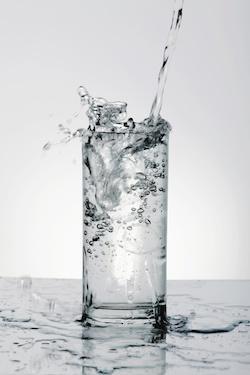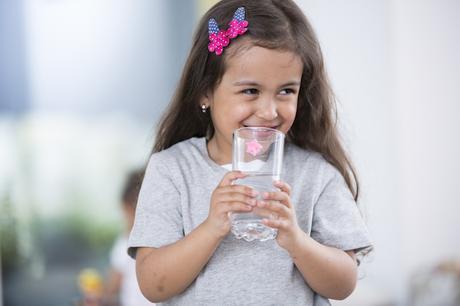
There has long been thought to be a link between weight loss and water consumption.
Up to 59% of US adults attempting to lose weight increase their water intake to help with weight loss (1, 2).
Recent studies have shown that there is a tangible link between weight loss and water consumption (3).
In a more recent study the link between inadequate hydration and weight gain is made explicit (4).
Increasingly, systematic studies of this area are being made, drawing the links between increased water consumption and weight loss (5).
In this article, I’ll examine the ways that drinking water can help with your weight loss.
Drinking Water Increases Caloric Burn
Studies have shown the effect of drinking water in terms of increasing your Resting Energy Expenditure (REE). In simpler terms, this is the number of calories you burn without doing anything else.
In one 2011 study, increases of up to 25% in REE were displayed in obese children. The effect lasted up to an hour (6).
Further studies showed increases of up to 24% in adults, with the effects once more lasting up to sixty minutes (7).
Studies have also shown increased energy expenditure in overweight women when already dieting, an additional benefit here being derived from drinking water (8).
One reason for this increased calorie burn is thermogenesis. This is the process whereby the body generates heat, and in doing so it uses calories.
When cold water is consumed the body expends energy in warming it, the colder the water, the more energy expended in warming it. In trial’s, there is a small increase in energy expenditure of 4.5% (9, 10).
A study trialed over 50 subjects and concluded that a daily increase in water consumption by 1.5 liters would lead to an additional energy expenditure of 200Kj, over the course of a year. This translates to the loss of an additional 2.4 kg (11).
In this instance, increased water consumption was the only lifestyle change made, not only does this highlight the importance of drinking water, but it also makes the results more reliable that other factors were not involved.

When compared to other beverages, water compares favorably where men exercising on a treadmill were split into two groups, consuming water and another a carbonated beverage. The group drinking water were found to expend 25% more energy (12).
KEY POINT: There is a weight of evidence that drinking water increases the rate of resting energy expenditure, and promotes weight loss.
Drinking Water Reduces Caloric Intake
Drinking before meals in order to feel full has long been a folk remedy for overeating. But recent studies show there may be a more scientific link than mere hearsay.
Often, we mistake thirst for hunger and then eat when we should be drinking. This increased caloric intake naturally leads to weight gain.
In this study, an explicit link was drawn between preloading with water before meals and weight loss when compared to a control group that didn’t (13).
In this study, it was shown that increased consumption of water with meals reduced energy intake (EI). The water drinking group lost on average 44% more than the non-water drinking group over the course of the study (14).
In another, it was shown that a group of girls drinking an additional 1.5 liters above their daily water intake showed significant weight loss gains. Similar results have also been observed (14, 15, 16).
It seems to be the case that this effect is more prevalent in older adults; there was less effect in younger drinkers (17).
In this study, it was found that increased water consumption with breakfast reduced EI in obese adults, taking in on average 13% less energy from their meal (18).
KEY POINT: There’s a tangible link between increased water consumption before and with meals and weight loss. This can in part be explained by thirst being mistaken for hunger but also by energy intake being reduced when water is consumed with meals. This effect is pronounced in adults, but there is no evidence of it in children at present.
How Increased Water Consumption Reduces in Caloric Intake and Decreases Risk of Weight Increase

As water has no caloric value, it is possible to draw a link between increased water consumption as a proportion of beverages consumed and weight loss (18).
If consumption of caloric beverages is replaced by consumption of water, it follows that the reduced intake of calories may lead to weight loss, all other factors being equal. Other beverages may contain high quantities of sugar, so their replacement with water can be a significant factor in reduced energy intake (19, 20, 21).
In a randomized study, replacement of caloric beverages with water lead to an average weight loss of 2-2.5% over the course of the study (22).
One study of Danish nine-year-olds found that the replacement of sugar-sweetened beverages (SSBs) with water had a significant impact on fat reduction (23).
This study showed an average lower daily intake of 194 calories in water drinkers, whilst this one consistently showed that those drinking SSBs prior to a meal rather than water had an increased energy intake in excess of 7% (23, 24).
Weight loss is, however, only part of the overall picture. Water has a role to play in the prevention of weight gain.
This comprehensive four-year study has been shown that water intake leads to reduced risk of weight gain (25).
As, on average, people gain over three pounds in weight over the course of four years, it’s clear that the replacement of SSBs with less caloric beverages, specifically water, will help to counter this effect.
The substitution of one SSB with a cup of water can lead to a reduction in weight gain of 1.1lb over a four-year period (26).
Due to the number of calories contained in SSBs (one can of Cola alone contains a hefty 139 calories, which is 5.5% of an adult’s daily intake), children are particularly prone to weight gain if too many are drunk.
An eight-year-old needs only 1745 kcal per day. A highly caloric SSB constitutes a massive 8% of a child’s RDA. If multiple cans are drunk, this can quickly add up.
Because of this, it’s particularly urgent to ensure that children drink water to prevent obesity.
The link between SSBs and childhood obesity is well documented; with the risk of childhood obesity rising in developed nations, water’s role in preventing this becomes ever more important (5, 27).
This is illustrated most effectively in this German study in which water fountains were installed in schools and their usage measured. After this intervention, the risk of obesity was decreased by an astonishing 31% (28).
KEY POINT: Palpable links have been drawn between the increased intake of water and reduced possibility of weight gain. This is especially notable in children. Water’s role in replacing sugar-sweetened beverages is important for weight loss.
How Much Water Should You Drink?
The standard advice is that most people should drink eight 8oz glasses of fluid, primarily water per day, this equates to roughly two liters. This is, however, an arbitrary figure, largely chosen because it’s easy to remember but not backed up by any evidence.

As a rough guideline, the Institute of Medicine recommends (29):
- Men: 13 cups (3 liters) of fluid a day
- Women: 9 cups (2.2 liters) of fluid a day
This figure, though, will vary from person to person; different individuals will have widely differing water needs (30).
Breastfeeding mothers are often advised to increase their fluid consumption, though evidence is limited as to the efficacy of this there is some indication that increased fluid intake may help.
Those who live an active lifestyle or work in hot environments will perspire more and require more water to replace lost fluids to avoid dehydration (31, 32).
Increasing water intake is particularly important for the elderly as dehydration can have a negative effect on arterial blood pressure (33).
It’s worth bearing in mind that a glass from the tap isn’t the only source of water. Water is present in all other beverages, as well as a variety of foods. But keeping in mind the role of water in weight loss and prevention of weight gain, water’s caloric value of zero means it is by far the most fat-friendly way to get fluid into your system.
In addition to its role in weight loss, water has an important role to play in staving off dehydration, the effects of which can include tiredness, headaches, and feeling light-headed, in addition to impairment of thought processes and negative impact on physical performance (34, 35).
The best advice is simply to drink water regularly, particularly if feeling thirsty. The human body is 60% water and doesn’t respond well to losing fluids.
Depending on your age and sex, the amount you’ll need will vary widely, but a two-liter minimum seems advisable.
KEY POINT: The amount of fluid required varies from person to person, but its importance in maintaining a body’s health cannot be underestimated in addition to its role in weight loss.
Bottom Line
The overwhelming weight of studies cited draw a link between increased water consumption, weight loss, and prevention of weight gain. But it should, of course, be stressed that water consumption is one part of a big picture.
As has been seen, its role in the removal of SSBs is a big contributory factor. Adequate hydration is a part of a healthy lifestyle which when taken in conjunction with good nutrition and regular exercise, leads to a happier, healthier, and slimmer future.
Has drinking more water helped you lose weight or improved you health? Let me know in the comments below.

